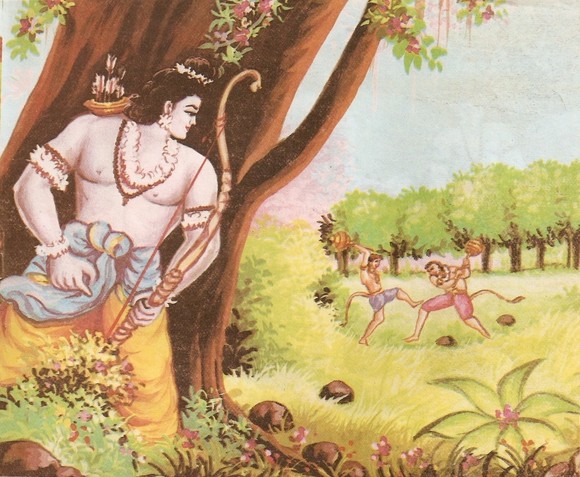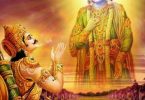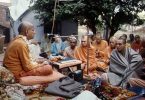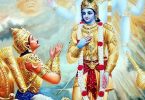Question: Sri Ramacandra made a statement that he could not recognize the difference between Vali and Sugriva, thus he did not shoot his arrow the first time Vali and Sugriva were battling, expressing the concern that he did not want to shoot his arrow at the wrong brother. [“Räma consoled Sugréva, explaining that He was unable to distinguish the monkey from his brother. Their features, dress, and ornaments were too similar. He suggested that Sugréva again challenge Vali, but this time wearing some distinctive mark so that Räma could tell one from the other.”] Yet some acaryas indicate that Lord Rama did not shoot his arrow because of an additional purpose: He first wanted Sugriva to correct his mistake/offense of not properly respecting Laksmana. Sugriva’s offense occurred when Rama was provided boughs with leaves from a tree to sit on, but the same hospitality and respect was not offered to Laksmana; noting this neglect, Hanuman himself provided a proper respectful sitting place for Laksmana.
Since Rama is known to be perfectly truthful, how to understand this discrepancy, namely his speaking an apparent untruth?
Answer by Romapada Swami:
There are multiple possible explanations.
1.One of the Ramayana commentators explains that this statement implies “Sugriva, you are an offender much like Vali. I don’t see a difference between you two.”
2.During the Dandaka Yatra, I mentioned that this statement is one of those that remains inexplicable because the Lord’s words are profound. For example, just as Bhagavad-gita is Krishna speaking to Arjuna, yet thousands of years since the event, after thousands of scholars and devotees have commented on it, still there remains some sense of confidentiality in it. Similarly, when the four Kumaras heard the Lord’s statements in Vaikuntha, they were confused due to the profundity of his speech, despite their being incarnations of his jnana sakti.
3.My recent response during a reading of Ramayana was that it is possible that both statements were honest and true – namely, that Lord Rama could not distinguish the difference between the two brothers while they were fighting –*AND* one additional inner contemplation of Rama, namely He wanted Sugriva to correct his offense. That this 2nd and the internal reason was not spoken to Sugriva does not constitute an untruth; rather, it displays the gentle and subtle kindness of Rama. Lord Ramacandra exercised his grace and his ability to correct another’s mistake in a simple non-confrontational manner. One commentary on this specific pastime (namely, Rama’s explaining to Sugriva why he did not shoot an arrow during Sugriva’s first encounter with Vali) precisely expresses this idea as follows.
Commentary:
In Yuddha Kanda Sarga 117 verse 11, there is a celebrated verse which says
ätmänaà mänuñaà manye rämaà daçarathätmajam
yo ‘haà yasya yataç cähaà bhagaväàs tad bravétu me
The first line of this verse can be translated as: “I, Rama, consider myself as a human being, the son of Dasaratha.” In telling Sugriva that He couldn’t distinguish Vali and Sugriva, Lord Rama is true to His lila that he will stay as a human being and not having any divine powers. In correcting Sugriva subtly, He is playing the role of the Supreme Lord. Thus, Lord Rama is exhibiting His divine and human nature simultaneously. The feature of the Supreme Lord is imperceptible while that of human nature is perceptible. Even in Rama’s killing of the demons, it was not by explicit usage of His divine energy. Instead, He used weapons given by sages like Viswamitra, Agastya, etc., and hence He was successful in His endeavor. Therefore, by considering the human facet, Lord Rama is not speaking an untruth.
A pastime related to the above verse (and not to the question raised above):
There lived a Sri Vaisnava preceptor by the name of Nanjeeyar about 900 years ago. Often, the king of the land would come to listen to his discourses. One day, the king took exception to one of Nanjeeyar’s explanations. Nanjeeyar was speaking on the Ayodhya Kanda of Valmiki Ramayana. Valmiki describes the many splendid qualities of Rama. He says Rama is none other than Vishnu Himself who had come to earth to kill Ravana. Rama is mighty, courageous, without envy, and given to speaking in gentle tones and words. Rama remembers only the good that people have done for Him. He does not keep in mind any harm that people might have done Him. Valmiki lists many such qualities of Rama and says that in His good qualities, Rama is like Dasaratha. The king could not accept this comparison of Rama with Dasaratha. The King asked, “How could Dasaratha, who had weakly given in to Kaikeyi’s wishes, ever be equal to Rama?” Nanjeeyar quoted the above verse from Yuddha Kanda and said that Rama declared gladly that He is Dasaratha’s son. The verse is spoken in the context of the celestials telling Rama of His divine qualities. Rama replied that He thinks of Himself as human, as Rama the son of Dasaratha. Would the Lord have so declared if He did not have regard for Dasaratha? When the Lord Himself had regard for Dasaratha, how could anyone think otherwise?
4. In the Mahabharata Tatparya Nirnaya, Chapter 6, in verses 14 to 20, Sripada Madhvacharya addresses this topic from a different perspective, by giving additional reasons for Lord Rama hesitating to kill Vali, during the first battle between the two brothers:
a. Lord Rama thought, “Should Sugriva eventually desire fraternal affection for Vali, I should not then kill the innocent elder brother. Anger among uterine brothers may not subsist long. Even if longstanding, it may cease along with the cause of it.”
b. Anger between brothers generally comes to an end again at the impending death of either, and immediate punishment of either may cause lasting regret (to the other). And so Rama, always free from any blemish, did not think it fit to kill him (Vali), now (in this fight). Therefore, when enmity has arisen among relatives, the death of either of them should not be caused quickly by the adherents of the other. It is only to illustrate this principle to the son of Ravi (Sugriva) and also to avoid any possible future regret, Rama, knowing all this, did not kill him.







